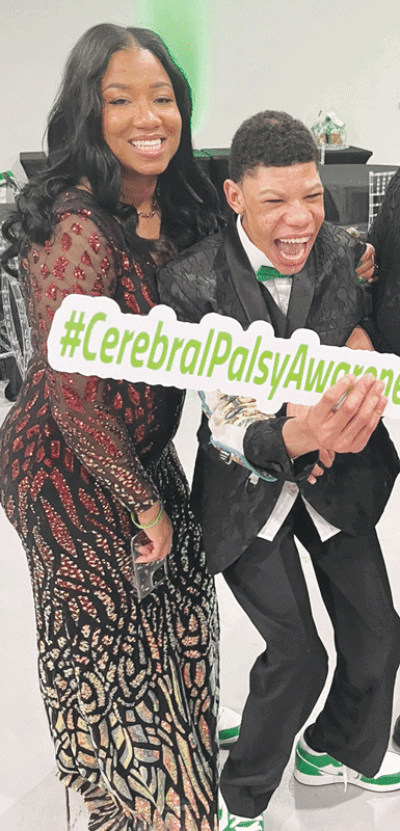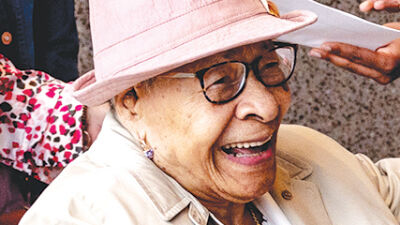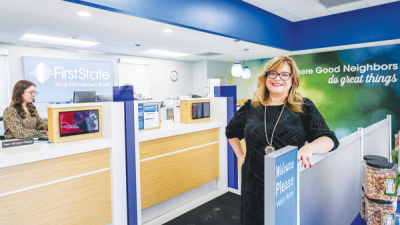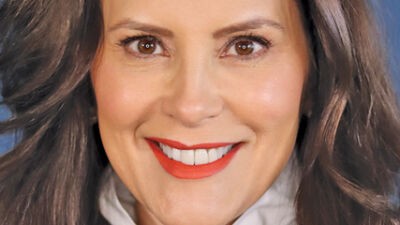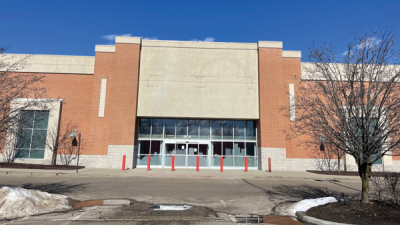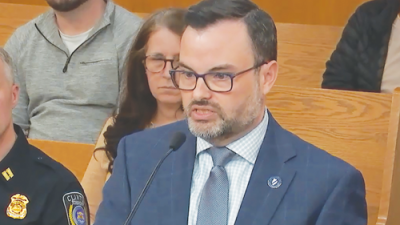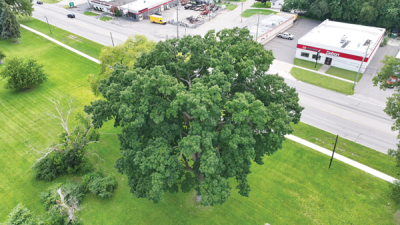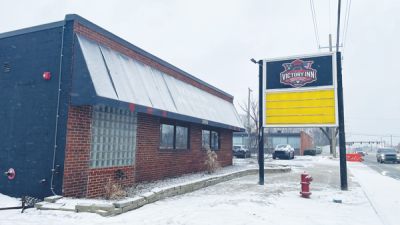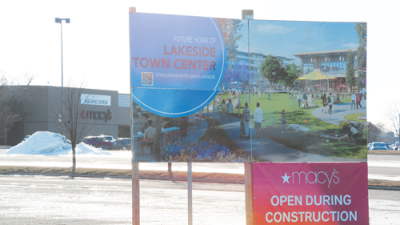SOUTHFIELD — “Process, patience, resilience.”
These are the words that Miriah Perkins used to describe what motherhood is like with her 15-year-old son, Darren, who has cerebral palsy.
According to the CDC, cerebral palsy is the most common motor disability in childhood, affecting about 1 in 345 children. It is more common in boys than in girls, and also more common among Black children than white children. It is a group of disorders that affect a person’s ability to move and maintain balance and posture.
At two weeks old, Darren was hospitalized for five weeks after being rushed to the hospital where she learned that he was having seizures.
When Darren was six months old, he began the Early On program at home to help him learn to sit up while working on fine motor skills. He still attends physical, occupational, and speech therapies two to three times per week throughout the year. However, it wasn’t until between the ages of 3 and 5 that Darren was diagnosed with cerebral palsy.
“When I found out the diagnosis, I had every emotion, but it was a lot of guilt first,” Perkins stated. “I thought of every ‘should have,’ ‘would have,’ ‘could have’ that anybody could think of.”
After the diagnosis was a trying time for Perkins; she felt so overwhelmed due to the mental, emotional, physical, and financial effects of being a special needs mom, which was something she never seen firsthand or imagined for herself.
Tammi Hart experienced a similar grieving process when her daughter Jada was diagnosed with CP. Jada was born at 30 weeks gestation, weighing 2 pounds and 8 ounces. She spent about a month and a half in the pediatric intensive care unit. Hart explained that Jada showed no signs of an issue during that time. However, around age 1, Hart noticed that one of Jada’s fingers always stayed in a bent position. She told the doctor that her mother’s intuition was telling her something was wrong, but the doctor attributed it to Jada being premature. Despite this, Jada had the ability to pick things up with her hands and sit up.
“Honestly, it was like we went to bed one night, and we woke up the next morning, and her hands were clenched. They no longer would open up. She couldn’t hold her head up. She couldn’t do anything like she used to do. She was just drooling. It was like, what just happened?” Hart said.
At 14 months old, Jada was diagnosed with CP. Hart and her husband were devastated. She said she went through the seven stages of grief upon receiving the diagnosis. Yet, while she was mourning her expectations for her child’s future, she and her husband immediately sprang into action, trying to educate themselves and find resources for Jada.
Despite CP being the most common motor disability for children, Perkins said CP had a lack of recognition, and not enough people were talking about it.
“They need to be seen. They need to be heard. They shouldn’t be hidden away,” Perkins said.
The lack of awareness surrounding CP is what led Perkins to found the nonprofit Rise4CP, which aims to “change the way the world views Cerebral Palsy while sending a global message of recognition, inclusion, support, and equity for all.”
Rise4CP was founded in 2016, when Perkins came across an Instagram post by another special needs mom who was spotlighting Cerebral Palsy Awareness Month. Despite being directly impacted by CP, Perkins had never heard of an awareness month for CP.
Striving to spread awareness and help others struggling with the mental, physical and financial challenges of CP, Perkins has fostered a strong community of CP families. Rise4CP officially became a 501(c)(3) nonprofit organization in 2018. In March 2021, a resolution was passed marking March 25 as Cerebral Palsy Awareness Day in Michigan.
“The community has been amazing,” Perkins stated. “There’s a corporate understanding of how someone may feel. Your empathy changes. Your compassion changes. It makes you more aware of the intensity of being a special needs parent. So, we get together, we talk, we laugh and sometimes we cry. But it’s a beautiful moment because we get to release and encourage each other.”
Hart met Perkins through a mutual friend last year at an event that Perkins was hosting. Hart said the two immediately clicked because they were able to bond over their similar experiences as CP moms.
Hart mentioned that an important topic that has surfaced among the CP caregiver community is self-care and the importance of learning that it’s OK for caregivers to take time for themselves.
“A lot of people don’t understand the emotional toll that it takes, because, for a lot of us, I always tell my husband, it feels like we’re on a roller coaster. And that roller coaster slows down, but it never stops,” Hart said.
Hart explained that the day to day is more than just changing pants protectors, feeding them, administering medications, doing laundry, cleaning, sterilizing equipment and bottles, and managing their schedules with doctor’s appointments and physical therapy.
“The big picture and the impact that it has on a caregiver physically, mentally, emotionally, it takes its toll. As caregivers, we always have to remind ourselves that it’s OK to take a break,” Hart said.
Perkins stated that she has learned to “let go of the guilt” when she takes time away for herself. “I know he’s with trusted caregivers. I need some time to myself to recharge. I’m not a bad mother. I’m not a bad caregiver. I’m just a human that needs to rest.”
Rise4CP honors Cerebral Palsy Awareness Month annually during the fourth weekend in March with an annual Rise4CP Gala. It hosts a walk for World CP Day annually during the first weekend in October. The walk took place this year on Oct. 8 at David H. Shepherd Park.
Throughout the year, Rise4CP holds various fundraisers to raise awareness and donate to those impacted by cerebral palsy.
On Nov. 28, Rise4CP will be participating in Giving Tuesday to raise funds for families affected by cerebral palsy. For more information, visit rise4cp.org. You can find Rise4CP on Instagram at @rise4cp and Facebook at #rise4cp.
 Publication select ▼
Publication select ▼